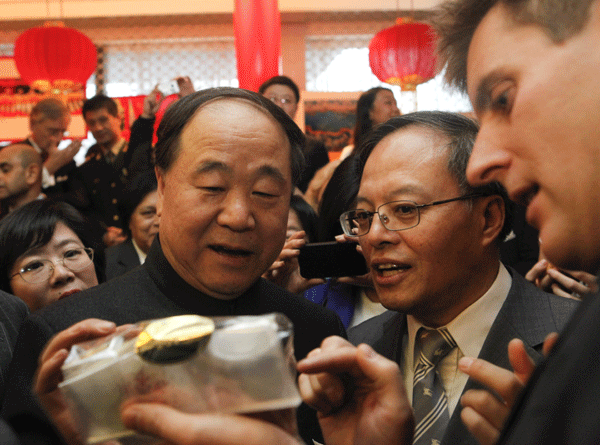 |
|
Mo Yan (left), the Chinese writer who won the 2012 Nobel Prize for Literature, receives a gift from a Swedish reader at the Chinese embassy in Stockholm on Friday. Shen Chen / China News Service |
Mohammed Elshijh, an Egyptian doctoral candidate at Beijing Language and Cultural University, chose to study Chinese literature after receiving his bachelor's degree in 1999.
As countries with long, rich histories, China and Egypt have much in common, Elshijh said, adding that Mo Yan, winner of the 2012 Nobel Prize for Literature, is also popular in his motherland.
Related: A tall story
"I have read Mo's novels such as Red Sorghum and Life and Death Are Wearing Me Out. His books are full of the smells of the countryside and reflect the relationship between the land and farmers," Elshijh said.
On Oct 11, Mo, 57, became the first Chinese writer to win the top literary prize. He will attend the award ceremony on Monday.
The Swedish Academy described Mo's works as having combined "hallucinatory realism" with Chinese folk tales, history and contemporary life.
"Through a mixture of fantasy and reality, historical and social perspectives, Mo Yan created a world reminiscent in its complexity of those in the writings of William Faulkner and Gabriel Garcia Marquez, at the same time finding a departure point in old Chinese literature and in oral tradition," the academy's citation for the award said.
 |
 |
Elshijh said he was excited when he learned that Mo had won the prize.
"Mo's winning of the prize is pushing Egypt to translate more of his works into Arabic," Elshijh said, adding that there is already an Arabic edition of Red Sorghum. And Egypt's Ministry of Culture recently announced it will translate another of Mo's works to Arabic.
However, contemporary Chinese literature remains less influential than mainstream Western literature, Elshijh said.
Cheng Shu teaches advanced Chinese reading in the International Chinese Language and Culture Center at Tsinghua University in Beijing. She was surprised that many of her students, who were all from other countries, were following the news of Mo's award.
"I know Mo's works are probably too difficult for them, but I still recommended that they read some," Cheng said.
Although Chinese literature is getting more attention around the world, translated versions of Chinese works remain in small supply in the United States and Europe.
|
|
|
|
|
|
|
|
